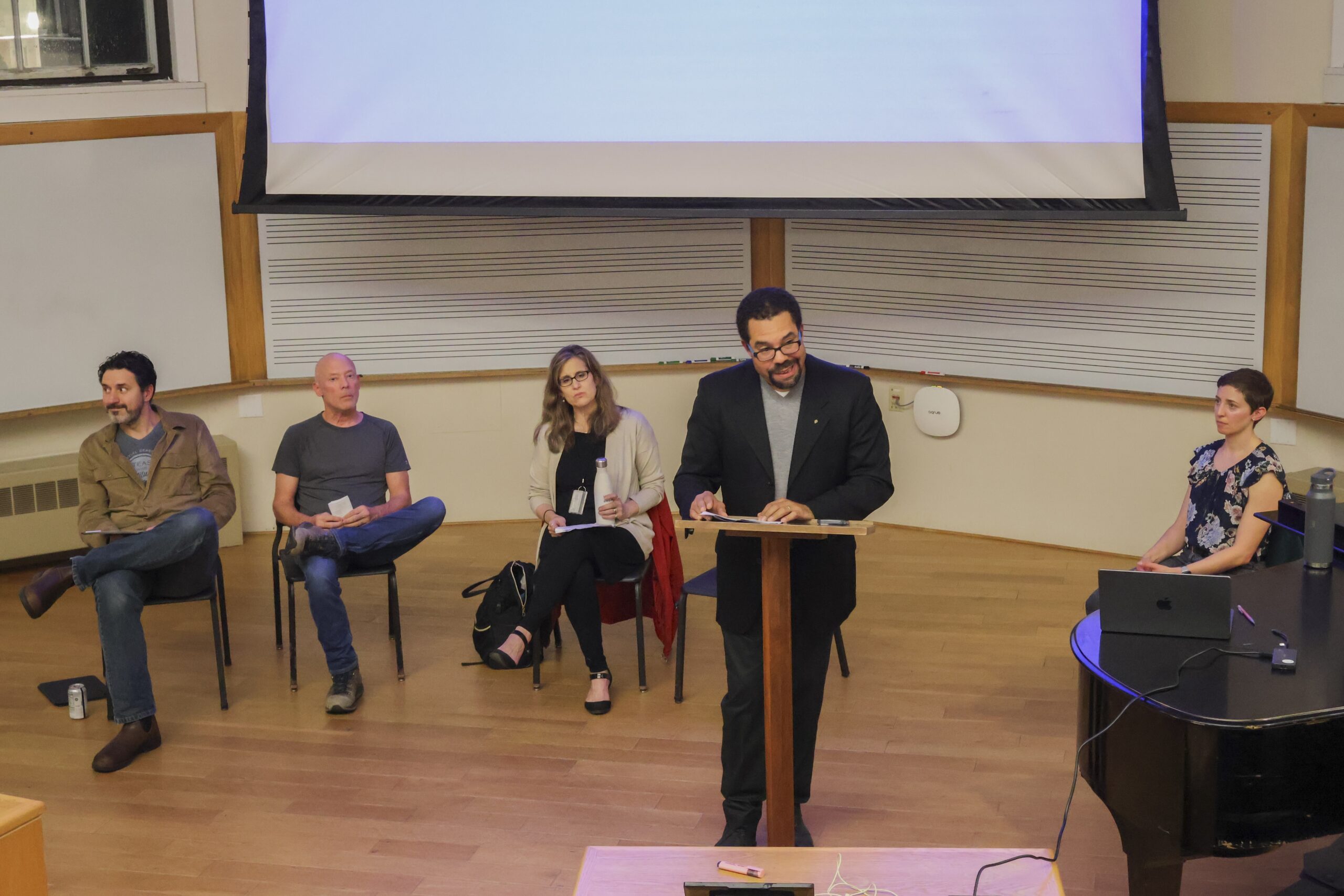History department panel unpacks political violence
September 26, 2025
 Abigail Hebert
Abigail HebertAt a panel for students and faculty last night, professors from the history department framed political violence with historical examples from their respective areas of expertise to make sense of current events in the United States. With four faculty leading the discussion, the event aimed to pose questions on how historians analyze political violence and to answer student questions about present-day instances of political violence.
Associate Professor of Africana Studies and History Brian Purnell opened the discussion by talking about the 1969 assasination of Fred Hampton, who was then the chairman of the Illinois chapter of the Black Panther Party, by Chicago police. At the end of his presentation, Purnell asked the audience to consider how the people in power influence what is constituted as a threat against the state and therefore how they respond to political violence.
“You can imagine how in a different context, with attacks against political norms being waged by people whose ideology and identity align with people in the highest seats of political power, a very different history of political violence would emerge,” Purnell said.
Next, Professor of History Page Herrlinger highlighted the assassinations of two tsars in Russia during the 19th century, both attacks orchestrated and executed by women, and the subsequent martyrdom of these women for their acts of political violence. Herrlinger posed two questions from these examples to help contextualize the impact of current acts of political violence.
“What role does the identity of the political actor play in determining the impact of their violent act? And what role does the identity of a victim of political violence play in how it plays out from then on?” Herrlinger said. “The one thing I can say is that once the act is committed, it is completely out of the hands of the actor.”
Assistant Professor of History Javier Cikota explored moments of past political violence throughout the history of Latin America. His first example was the 1909 attack on the chief of police in Buenos Aires, which led to the enactment of anti-union and anti-immigrant laws. He then discussed the 1954 assassination of a journalist in Brazil that prompted widescale protests against the government. Lastly, he talked about the 1973 Chilean military coup that led to dictator Augusto Pinochet’s Caravan of Death execution squad.
“I take three examples of political violence, one [centering on] violence between individuals, one between an individual and a state agent and one from the state against individuals. I picked these because they might help us think about the contingency of history, how the messiness of history makes it hard to predict what the outcome of events might be,” Cikota said.
Professor of History Patrick Rael identified several critical moments in American history that parallel current events to explain the importance of history in making sense of the present.
“The past doesn’t repeat itself, but it does offer experiences and insights that help us put the present in perspective…. The American history I teach feels full of insights for the present moment,” Rael said.
Beyond understanding the present, Rael argued that engaging with history is vital to the maintenance of a healthy democracy.
“[History] teaches us methods for distinguishing defensible claims from spurious ones. It urges us out of information silos, challenges our inclination to believe whatever we want to believe just because we want to believe it. It reminds us that we’re accountable to those who fought for the liberties we enjoy,” Rael said. “Finally, it shows us how previous generations had resisted forces that would reduce the best of this troubled country to the plaything of corrupt oligarchs.”
Bringing the panel back to the present, students and professors in attendance asked questions about the recent shooting of Charlie Kirk, censorship of media and the ways in which individuals can combat unfounded and violent narratives permeating throughout the country. In response to a question regarding Kirk’s assassination, Purnell urged the audience to consider what the event reveals about the current political climate.
“Do you see his martyrdom as a pretext for increased political violence and suppression of speech against those that you disagree with? That’s going to have its own set of consequences, or is there another way to think of this political violence … perhaps as revelatory of really deep trouble within our democracy,” Purnell said.
In addition to speaking to the historical context for modern political violence, several of the panelists explained why examining a historical perspective on the topic of political violence offers merit that may be overlooked in other modes of thought.
“Historians don’t do anything fast. We slow everything down because we want to listen. We want to think about it all,” Herrlinger said. “I actually think at a time like this, we’re the most likely to break [the current moment] down to its core parts and really kind of try to rebuild it.”
Cikota added that while history can impart lessons aiding in the interpretations of current events, political violence is inherently unpredictable.
“I would like to leave you with a suggestion that violence often begets more violence and [that it] is not ever certain how violence will unfold. Anyone that seems confident about what comes next is most likely wrong,” Cikota said.
Editor’s Note September 29, 2025 at 5:32p.m.: An earlier version of this article misinterpreted Purnell’s concluding thoughts from his presentation and read “how the anti-capitalist ideology of the Black Panther Party influenced the narrative that the police were attacked by perceived radicals as opposed to the state attacking individuals” which is now updated to “how the people in power influence what is constituted as a threat against the state and therefore how they respond to political violence.”

Comments
Before submitting a comment, please review our comment policy. Some key points from the policy: